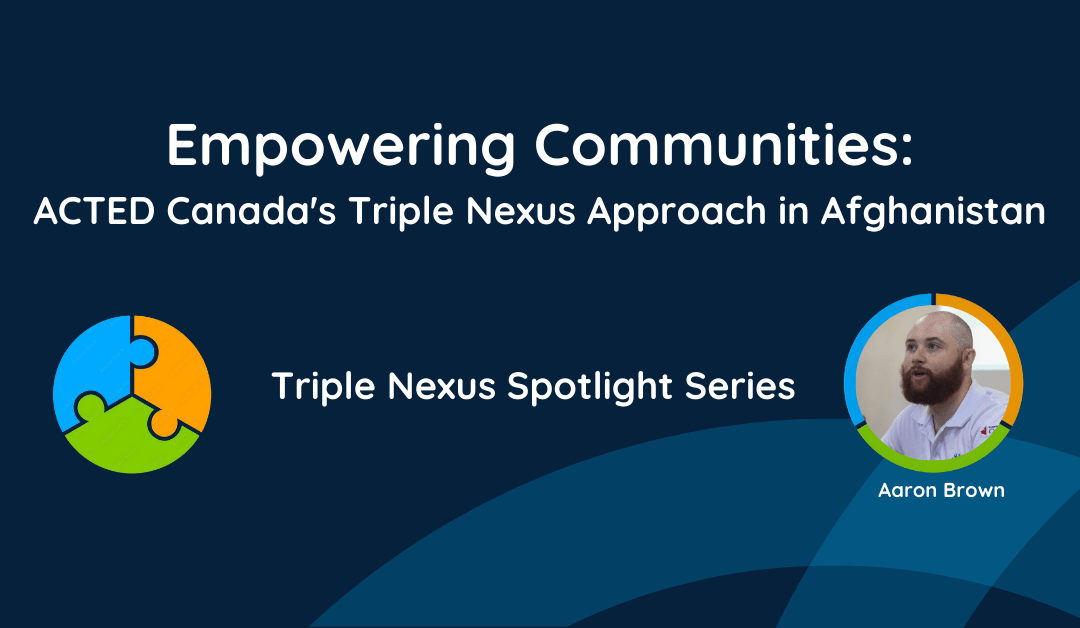This story is part of Cooperation Canada’s Triple Nexus Spotlight Series
ACTED Canada, as part of a global network, is dedicated to a unique approach known as ‘Triple Nexus.’ This approach combines three critical areas: humanitarian aid, development initiatives, and peace-building efforts. The goal is to create sustainable and impactful programs in challenging environments. ACTED’s commitment is reflected in its 3ZERO vision, which aims for Zero Exclusion, Zero Carbon, and Zero Poverty. This vision underlines our dedication to inclusive and sustainable development and maintaining peace. By working closely with Canadian and international partners, ACTED Canada plays a significant role in advancing the Triple Nexus approach globally.
AGORA’s Role in Implementing the Triple Nexus
AGORA, a strategy developed by ACTED, is central to implementing the Triple Nexus approach effectively. It is an area-based method that focuses on integrating local knowledge and needs into program planning and execution. This involves identifying local areas, engaging community members to understand their needs, and then addressing these needs in a way that fits the local context. AGORA helps ACTED effectively respond to immediate humanitarian crises, support long-term development, and contribute to peacebuilding in areas with complex challenges.
Case Study: Sustainable Rural Development in Afghanistan
In Afghanistan, AGORA’s implementation within the Triple Nexus framework was critical in creating sustainable, peaceful communities. Focusing on local areas known as “manteqas,” the program integrated humanitarian aid with development and peacebuilding efforts. For example, in agricultural improvement projects, AGORA ensured that the initiatives addressed not just food insecurity but also contributed to managing conflicts related to resources. This holistic approach was vital in addressing immediate needs and building long-term resilience.
Challenges and Lessons from the Triple Nexus Implementation
Although highly effective, the application of a Triple Nexus approach through AGORA in Afghanistan highlighted several challenges:
- Inclusive Engagement: Engaging diverse and marginalized groups in decision-making was complex, often impacted by cultural and societal barriers. This is amplified when working across the development, humanitarian, and peace sector.
- Balancing Immediate and Long-term Needs: It was challenging to manage resources effectively for immediate humanitarian needs while also focusing on long-term development and peacebuilding.
- Adapting to Security Situations: The evolving security scenarios in Afghanistan required constant adaptation of interventions.
These challenges emphasize the need for strategies that are adaptable, context-sensitive, and heavily involve the community for effective implementation.
Broader Implications for a Triple Nexus Approach
The success of the Sustainable Rural Development Program in Afghanistan serves as a testament to the effectiveness of a Triple Nexus approach. It demonstrates how approaches that are participatory and localized can address complex challenges encompassing humanitarian aid, development, and peacebuilding. This case study provides a blueprint for applying similar strategies in other complex environments.
Conclusion
ACTED Canada’s application of the AGORA methodology in Afghanistan is a prime example of the innovative and transformative potential of the Triple Nexus approach. Their work goes beyond addressing immediate needs; it sets the foundation for a future that is resilient, peaceful, and sustainable. This approach can serve as a model for integrated development efforts across the globe.
This piece is authored by Aaron Brown, Project Development Officer, Acted Canada

